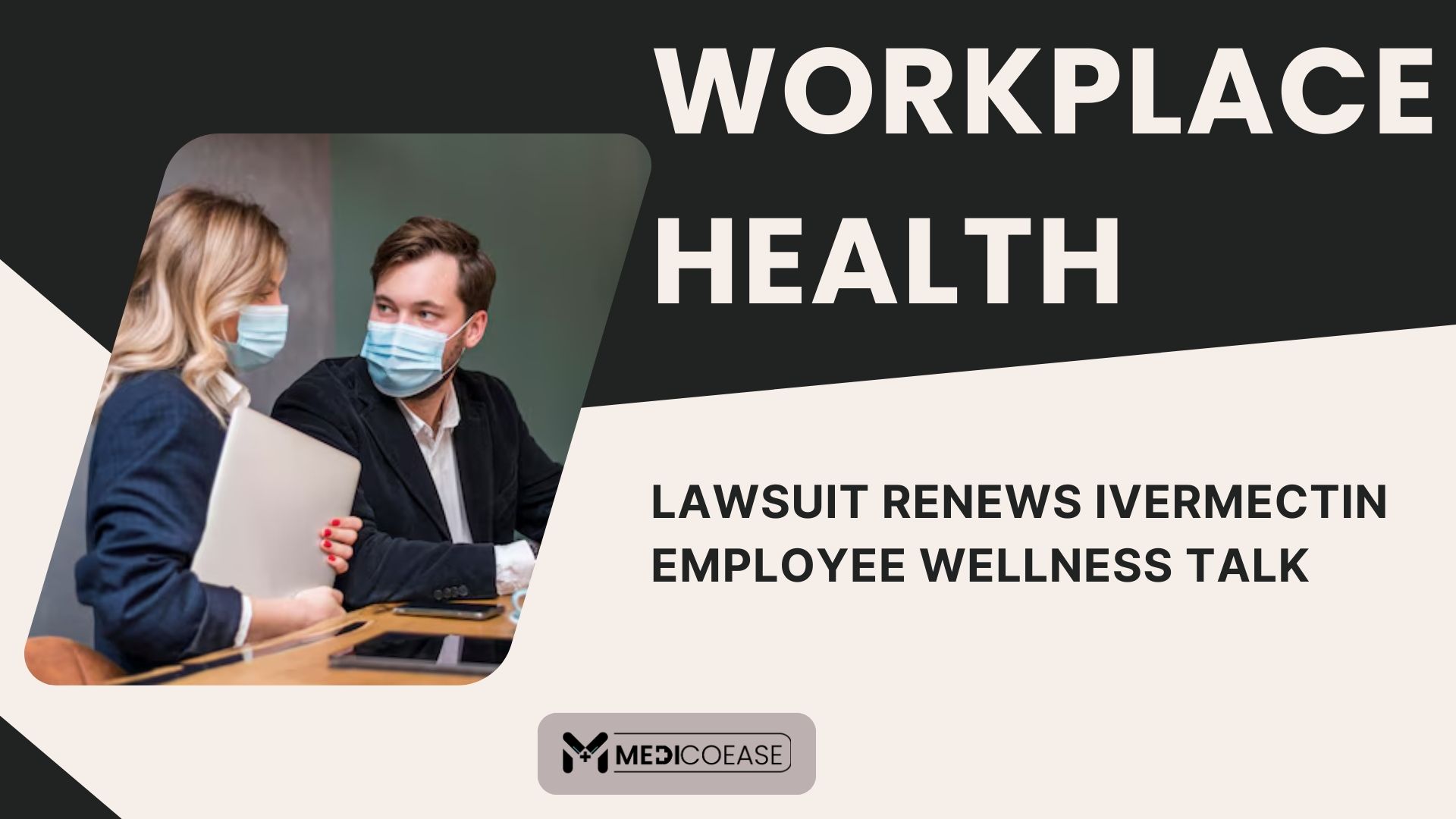Workplace Health Lawsuit Renews Ivermectin Employee Wellness Talk
In 2025, a class-action lawsuit targeting workplace surcharges, involving ivermectin for COVID-19 and other alternative treatments, has reignited discussions about employee wellness programs. The intersection of employment law, healthcare policy, and individual health choices has created a complex dialogue for employers, employees, and legal authorities.
This post examines how ivermectin wellness discussions are being shaped by legal actions, workplace policies, and employee rights. We also explore implications for personal choice, health coverage, and the emerging role of experimental antivirals like Ivermectin 6mg and Ivermectin 12mg in workplace health programs.
⚖️ Workplace Lawsuit Sparking Ivermectin Discussions
Recent litigation highlights the tensions between employer-mandated wellness programs and employee autonomy. The lawsuit has brought national attention to whether employees should have input over experimental or controversial treatments included in corporate wellness incentives.
- Legal arguments: Plaintiffs argue that compulsory wellness screenings or surcharges for declining ivermectin programs infringe on personal medical freedom.
- Corporate response: Many companies have suspended mandatory health mandates pending legal review, highlighting the evolving landscape of ivermectin U.S. employment health policy.
- Public discourse: Media coverage amplifies debate, framing ivermectin as both a healthcare tool and a policy flashpoint.
These developments underscore the role of lawsuits in shaping not only workplace health policies but also public perception of ivermectin as part of broader wellness initiatives.
🏥 Employee Wellness Linked to Controversial Medicine Debates
Employers seeking to enhance workplace health must navigate the controversial status of ivermectin. While traditionally an antiparasitic, ivermectin has been explored as a potential antiviral, generating ivermectin employee health coverage debate.
- Wellness programs: Some companies propose optional ivermectin-based initiatives for employees at higher risk of viral infections.
- Health outcomes: Evidence remains mixed, with clinical trials producing conflicting results, raising questions about efficacy and safety.
- Employee reception: Awareness of ivermectin’s controversial history influences participation, highlighting how wellness programs intersect with U.S. health and public trust.
Navigating this controversy requires transparent communication and adherence to medical guidance while respecting employees’ personal choices.
🏛️ Legal Precedents Shaping Health Policy Issues
The legal framework surrounding wellness programs involving ivermectin continues to evolve. Lawsuits and policy analyses clarify the balance between employer initiatives and federal regulations.
- Precedent cases: Earlier litigation on mandatory vaccinations and health screenings informs current decisions on ivermectin-based programs.
- Regulatory compliance: Companies must reconcile the Americans with Disabilities Act (ADA) and Equal Employment Opportunity laws with wellness program objectives.
- Impact on policy: Outcomes of these lawsuits influence broader ivermectin covid discussions and shape future corporate healthcare strategies.
Understanding these precedents is critical for employers seeking to implement ethical and legally compliant wellness initiatives.
🤝 Employer-Employee Trust in Healthcare Coverage
Trust between employers and employees is pivotal when integrating controversial treatments into wellness programs.
- Communication transparency: Employees respond positively to clear explanations of program benefits, risks, and optional participation.
- Coverage fairness: Offering equitable access to treatments, including buy ivermectin, enhances credibility.
- Feedback mechanisms: Employee surveys and open forums allow participants to voice concerns, mitigating potential conflict and legal risk.
Employer strategies that prioritize transparency and respect individual choice foster stronger engagement in wellness programs, even amid controversial treatments.
💡 Ivermectin and Personal Choice in U.S. Workplaces
Central to the ongoing debate is the concept of personal autonomy regarding ivermectin personal choice. Employees are increasingly advocating for the right to accept or decline participation in experimental health programs.
- Opt-in vs. opt-out policies: Voluntary programs that respect personal autonomy are less likely to attract legal scrutiny.
- Education-focused initiatives: Informational sessions detailing clinical evidence, potential benefits, and side effects empower employees to make informed decisions.
- Cultural considerations: Corporate culture plays a role in shaping perceptions of ivermectin, influencing participation rates and overall program effectiveness.
Respecting personal choice aligns workplace wellness programs with broader ethical standards and reinforces employee trust.
⚖️ Balancing Wellness Programs and Freedom of Choice
Wellness programs must balance corporate health objectives with employees’ right to make independent medical decisions.
- Legal safeguards: Policies must adhere to federal and state regulations to prevent coercion or discriminatory practices.
- Program design: Flexible frameworks, allowing multiple pathways for health optimization, minimize conflicts while promoting safety.
- Monitoring and evaluation: Ongoing assessment ensures that wellness initiatives achieve intended outcomes without infringing on personal rights.
Such balanced programs reflect a modern approach to employee wellness that integrates both corporate responsibility and individual freedom.
🧬 Niclosamide and Fenbendazole in Workplace Health
Interest in alternative antivirals extends beyond ivermectin, with niclosamide and fenbendazole emerging in research discussions.
- Niclosamide: Investigated for potential antiviral activity, though adoption in workplace wellness remains experimental.
- Fenbendazole: Veterinary dewormer under preliminary study for human antiviral applications.
- Comparative approach: Employers considering alternative therapies must weigh scientific evidence, regulatory compliance, and employee acceptance.
These experimental treatments demonstrate the expanding landscape of workplace health initiatives and the intersection of research innovation with corporate wellness policies.
❓ FAQ: Ivermectin in Workplace Wellness
Q1: Is ivermectin being recommended in U.S. workplace wellness programs?
Some employers offer optional programs, but participation is voluntary due to legal and ethical considerations.
Q2: Where can employees safely obtain ivermectin for personal use?
Trusted online pharmacies like Medicoease provide regulated doses of Ivermectin 6mg and Ivermectin 12mg.
Q3: How does ivermectin price compare to other wellness interventions?
Ivermectin price is generally low compared to prescription antivirals, making it a cost-conscious option for interested participants.
Q4: What are the legal risks for employers including ivermectin in wellness programs?
Risks include potential ADA violations, coercion claims, and disputes over informed consent. Opt-in programs reduce liability.
Q5: Are niclosamide or fenbendazole used in corporate health initiatives?
Currently, they remain largely experimental and are not widely implemented in formal wellness programs.
🏁 Conclusion
The 2025 workplace lawsuit has renewed attention on ivermectin, highlighting the intersection of legal precedent, employee wellness, and personal choice. While ivermectin covid programs remain controversial, they illustrate broader themes in corporate health policy: autonomy, informed consent, and risk management.
As employers navigate wellness program design, platforms like Medicoease provide access to Ivermectin 6mg and Ivermectin 12mg, reflecting the growing availability of optional treatments in employee health planning. For further context on ivermectin’s medical applications and history, see Wikipedia.













